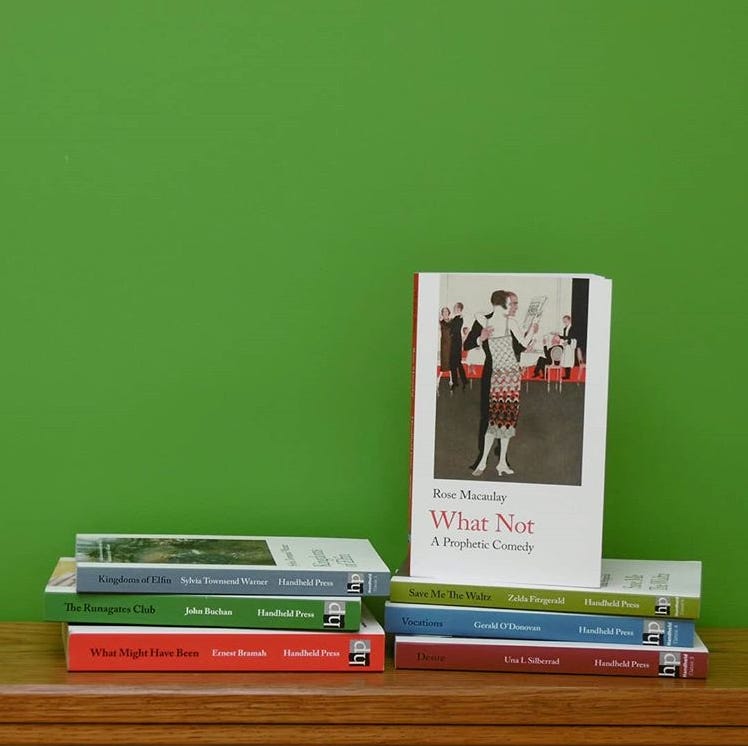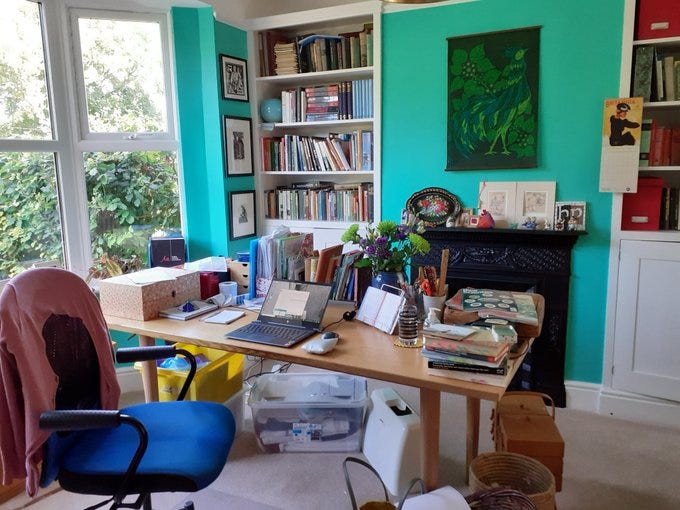In this month’s second instalment, let me introduce a brilliant independent publisher and a jumble of things I’ve been reading and listening to recently. If you haven’t already, please subscribe and share - it helps massively. Lastly, I also want to announce the winner of all of Luke Bird’s recommended books is @Tamreezi - thanks for all your support!

Read the Small Print: Handheld Press
Before setting up Written Approval I played around with the idea of doing something to support independent publishers in the age of behemoth publishers. I’m always coming across indies doing wonderful things, publishing subjects and authors that deserve greater attention, and one of them is Bath-based Handheld Press. I first heard about them through interviewing A.N Devers for BookBrunch, who runs The Second Shelf, a bookshop in London which sells rare books by women. If you find yourself in Soho, it’s so worth a visit (the first time I went my son and Roxane Gay became firm friends).

Expect from Handheld beautifully designed covers and end papers, and forgotten stories “of quirk, edge and strong women”. Like so many indie publishers, it’s run by a small, dedicated team (who work out of this wonderful office above). Kate Macdonald is the director and kindly got in contact after the launch of Written Approval to offer a couple of new books to one reader.
Alongside running a publishing house, she’s a leading academic on British author Rose Macaulay, whose novel she reissued at Handheld called What Not: A Prophetic Comedy. Hugely successful after its publication in the 1918, it later fell out of public consciousness, and yet it’s full of wit and prescience, telling the story of government sanctioned eugenics in order to prevent another war. It’s also believed to have inspired Aldous Huxley’s A Brave New World. It’s a great place to start with Handheld’s titles. To add to that, a further two Macaulay books have just launched and Kate’s offered to give them away.
To win a copy of both the following new Handheld titles, click here. Good luck!
Pottersim: A Tragi-Farcical Tract, a 1920s satire on fake news.

Non-Combatants and Others. Writings Against War: 1916-1945, a selection of stories, essays and articles against fascism.

What I’ve been reading & listening to this month: the soundtrack edition
This section comes with a soundtrack accompaniment. I stole this idea from Man Booker International who paired each of their nominees with music (I interviewed Deezer’s UK music editor who worked on this project with MBI here - sorry link only accessible for BookBrunch subscribers). I’d love to hear what your choices would be, especially since I spent an inordinate amount of time thinking of these...
Alone in Berlin by Hans Fallada (Penguin Modern Classics). Many of you will already know this German classic. Inspired by the true story of a Berlin couple who defied the Nazi regime in their own small way, it tells how many ordinary Germans resisted and resented their government, something we don’t often hear about. Because of the nature of the story, which doesn’t shy away from the brutality, it would be an almost unbearable read if it were not for the deadpan tone of novel, helped by the brilliant translation by Michael Hoffman. Go read it if you haven’t, and while you’re there check out Fallada’s own personal story, which is quite incredible.
🎶 Keep the Car Running by Arcade Fire
Home by Marilynne Robinson (Virago). Technically I reread this a couple of months ago, but I came back to it to write an article about the significance of the family’s garden for an article in Bloom (the issue is out now). Robinson, who won the Pulitzer, is such a gifted writer. I cannot wait to read Jack, which has just been released.
🎶 Rollin’ Stone by Muddy Waters
How Much of These Hills is Gold by C Pam Zhang (Virago). I was so pleased to hear of a novel about Chinese history in the American West, and even more so on discovering it had made the Booker longlist (sadly didn’t make the shortlist, which was announced last week). The quality of Zhang’s writing is mesmeric; poetic at times. I loved the themes on land, ownership, identity and home. It’s such a daring debut and I will certainly pick up anything else Zhang writes.
🎶Jasmine Flower by Mo Li Hua
Undue Influence by Anita Brookner (Penguin). Every Brookner I read consolidates what a wonderfully perceptive mind she had. Don’t expect explosive plot turns, but do expect clever observations by lonely Londoner Claire, served with a huge amount of wit.
🎶 Eleanor Rigby by The Beatles
The Appointment by Katharina Volckmer (Fitzcarraldo Editions). I admit, I’m not usually a fan of streams of consciousness. In this case, though, there’s such boldness and inventiveness from Volcker it’s hard not to admire. The whole story is essentially a monologue, spoken by a young German woman in London to a Dr Seligman.
It’s pretty X-rated, but here’s a PG taster:
“Do you ever go and sit in that park outside your window, Dr Seligman? When I still had a job, I used to go and sit in the park near work during my lunch breaks, the kind of pretty park the Germans would have vandalised but that the Brits treat like a sacred space, with real flowers and well-meaning dogs. But now I don’t really go anymore. I fear that people might notice what’s going on with me, and sitting there in my current state I would feel like a fraud. The other reason I stopped going to the park was that having to regularly listen to other people’s conversations made my organs bleed.”
🎶 Robots by Kraftwerk
What are you reading?
The New Statesman: Why Goodreads is Bad for Books: Do you use Goodreads to track your reading? I know a lot of people do, and while I started a page years ago, I admit I could never get into the swing of updating it. Here are other reasons it might be on the way out. Watch out for a new alternative called The StoryGraph.
🗞️ The Guardian: Most Diverse Booker Shortlist Ever as Mantel Misses Out. There are many things to discuss in this article: whether Americans should have been allowed to enter the prize, what counts as diversity (this article’s focus is on race) and does the exclusion of Mantel, who is one of my favourite writers, really suggest we are marching towards progression?
🗞️ The TLS: The Story of a New Name. If your reaction to the Women’s Prize for Fiction’s Reclaim Her Name campaign was lacklustre at best, you’re not alone. This article sums up why it felt like a mis-step for me. Superb by Catherine Taylor.
🗞️ The New Yorker: Has Self-Awareness Gone Too Far in Fiction? Agree? I’ll leave you to decide. Katy Waldman lays out the argument persuasively even though I didn’t wholly buy into all her points.
🎧 BBC Sounds: The Reunion: Virago Press. Yes, a month cannot pass without a mention of Virago. This podcast, however, is such brilliant listen, taking us back to the era and politics of the time, and brings together some of the founding members.
That’s it for this month. Next month I’m back to one newsletter, unless you’re a fan of two instalments? Let me know. As ever, I’d love to hear your what you’re reading and your thoughts on Written Approval.
Written Approval by Julie Vuong @julesvuong
Illustration by Aniko Aliyeva @anyevastudio
Logo designed by Willow Design Studio
A note on how Written Approval is funded
Written Approval is free to read. In future, to help build it, I hope to add subscriber options. The best way right now to support me is to share and subscribe! There will be affiliate links in future, which won’t cost you anything but gives something back to the newsletter.



